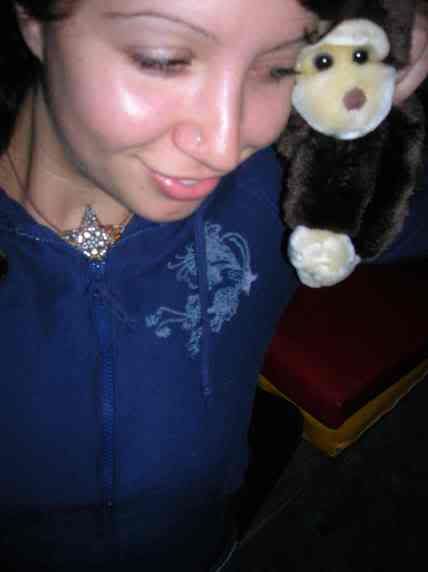Five: Continued.
The passage was be-decked with shells, stones and glass mosaics, and we spent a solid two minutes walking before we finally came to a brocaded door and knocked. A French-accented voice said to come in, so we opened it and peeked around into the room beyond.
The room was a huge laboratory. In shocking contrast to the grotto without, everything was undecorated stainless steel. Gauges wagged, beakers bubbled, monitors beeped, and panels’ knobs blandly reflected the plain, practical lights. A huge chair on the opposite side of the room swivelled from a computer screen to face us, revealing a very small woman, wearing very large glasses and a white lab jacket.
“Hmm. You must be Lima Bean and Willoughby” she said, “I wasn’t expecting you unteel tomorrow.”
“Yes. You must be Dr. Buttersfirth?” I ventured.
“Camellia, cherie, Camellia. Well, have a seat! And let me just see eef I can find you sometheeng to put on--you’re dreeping wet!”
It was true. I had turned up to meet one of the greatest scientists EVER with a wet navy blue bikini, and a very wet Willougby!
She handed me one of her own spare lab-coats to wear as a cover-up, but because she is such a small woman, and I am a rather tall one, it looked more like a very mod mini-dress than any attempt at modesty. I blushed (Willoughby laughed) but she was so kind that I was set at relative ease.
She gave us a tour of her lab, which was incredible: “Zis ees where I can track global weather trends” she said, pointing to a large monitor (attached to a panel with many knobs), “Zis ees where I am working on an compound zat weell destroy atmosphereec green-house gases” she said pointing to a counter with many elaborately labeled vials, “Zis ees how I prevented a life-eradicating meteor from smashing eento ze Earth two years ago” she said pointing to a chalk-boardful of calculations, “just a seemple trick of inter-planetary refraction” she said with a wink, “Zis ees the Convention’s teletransporter” she said, pointing to what looked like a beauty-shop hairdryer (it turns out that it had, in fact, been a beauty-shop hairdryer; apparently they are not far from teletransporters in their natural state) “and zis” she said, pointing to a bubbling vial, “ees where I am formulating a new soda pop.”
Willoughby and I looked on with awe. She was 5’1’’ of pure brain.
“I have many more projects underway, but zey are all in my real lab in France,” she added.
Next, we followed her to the opposite side of the lab from where we had come in to an elevator which linked her lab to the H.H. island.
“Thees is the front door, by the way” she laughed.
Arriving in the Headquarter’s Glen, we sipped cold lemonade and discussed many of life’s greatest mysteries. Like whether or not time-travel is possible, what happens to people when they die and how death can be almost entirely prevented; whether or not humans will ever be able to live peacfully as a species and whether monogamy is or isn’t a biological impossibility; how the pyramids were built, whether or not life like ours exists on other planets, why you didn’t have to breathe while swimming in the hermit’s lake (it’s infused with a skin-absorbable oxygen, she said!) and why vegetables like brocolli and cauliflower cause gas.
Then, as the afternoon waned, she abrubtly stood up, said that she must get back to work, but said she was happy to meet us, that she looked forward to seeing us again soon, and that I ought to keep the lab jacket that she had lent me since it was so becoming.
She must have been telling the truth, because it was on the way home that I caught the eye of the sexiest (and shyest) hermit that I had never met.
next chapter
